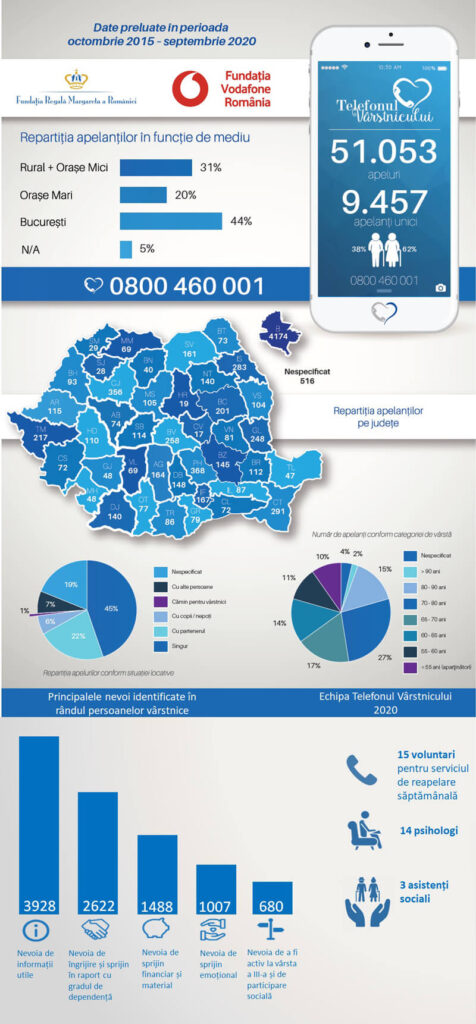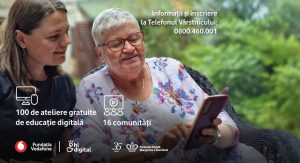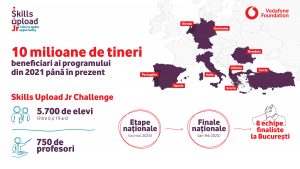- The need for information remains the main reason why seniors call the Elderly Line
- Over 2,700 people asked for support over the Elderly Line in 2020, twice as much as in the previous year
Bucharest, November 4th, 2020 – The Princess Margareta of Romania Foundation launches The top needs of Romania’s elderly and explains the solutions offered in response to those needs. The ranking was created by processing the data collected by the Elderly Line which, in over five years of activity, recorded over 51,000 interactions with seniors from across the country, approximately 9,500 of these being unique callers.
The Elderly Line is a free helpline which offers solutions to the needs expressed by Romania’s elderly (information, counselling, practical or emotional support). The social project was launched in 2015 as a response to the issue of population ageing and was financed for a total of RON 837,500 by Vodafone Romania Foundation.
3.7 million people in Romania are over 65, which represents 19% of the country’s resident population, according to the INSSE Report of January 1st, 2020*. Also, our country is ranked second among European countries for the pace of population ageing. In this context, the Elderly Line social service responds to the needs of Romania’s seniors and is the only free, confidential line dedicated to them, being accessible nationwide. The elderly receive specific, practical and up-to-date information regarding the services or solutions available for the issues raised. The calls can be made to 0800 460 001, Monday to Friday between 08.00 – 20.00 and Saturday between 08:00 – 16:00.
Out of the 9,500 unique callers who dialed the Elderly Line between 2015 and 2020, 44% live in Bucharest, 31% in rural and small urban areas and 27% are between 70 and 80 years old. The top needs declared by Romania’s elderly include five main categories: 1. useful information; 2. care and practical support; 3. material and financial support; 4. emotional support; 5. the need to be active and participate in society. After analyzing the data collected over the five years of activity, it is apparent that the dynamic of problems and life situations faced by the elderly has not changed significantly. This is largely due to an acute lack of development of social services, public or private, destined for elderly people.
The main reason why seniors call the phone line is the need for useful information, caused by social phenomena like isolation, marginalization and discrimination of the elderly, as well as by their inability to adapt to the new communication technologies. Following the analysis, it was found that the number of people who asked for various information is higher in Bucharest (1,786) and Transylvania (626), the lowest number being recorded in Dobrogea (142).
Regarding the need for care and practical support, this is expressed through specific requests for information and medical assistance, specialised supervision, references about nursing homes for the elderly and the institutionalization procedure. 48% of those who expressed these needs are between 70 and 90 years old.
The need for emotional support is determined by the loneliness and social isolation which many elderly people feel, even if some of them do not live on their own. 45% of the phone line callers live alone, 22% live with their partner, 6% with their children or grandchildren and 1% declared they were in a nursing home. As a response to the loneliness issue, the Elderly Line offers its own weekly call back services or redirection to partner organizations. In the context of the pandemic, the team of specialists at the Elderly Line offers psychological counselling and emotional support to elderly people facing anxiety or depression, heightened by the state of isolation.
According to INSSE*, in the last three years, the poverty rate among the elderly has registered a 4.3% growth. The situation is all the more complicated in the context of the pandemic. From March until present, 707 requests for financial and material support were recorded, the majority from Bucharest and the Muntenia region. Seniors were directed towards social assistance services in the community, operated by General Directorates of Social Assistance or NGOs, to receive various types of help. For the elderly who express their need to be active and participate in society, the Elderly Line proposes community volunteering activities and participating in senior club activities. Fortunately, there are programmes which have adapted their activities to the online environment during the pandemic, such as the “Generații” Community Centre, the Centre for Seniors of Bucharest, the “Niciodată Singur” Association.
During the state of emergency caused by the COVID-19 pandemic, the number of interactions recorded daily by the social service has doubled compared to the previous period – over 3,000 calls and 900 unique callers. In the context of the pandemic, the material and financial support requests intensified and placed this need ahead of that for emotional support. Nonetheless, once the state of emergency was lifted, the problems of the elderly returned to their initial patterns.
The Elderly Line received an award for originality in 2016 and was named the best Social Assistance project in Romania at the Civil Society Gala in 2019.
Partner: Vodafone Romania Foundation
Sponsors: Hochland Romania, Johnson Wax, Nuclearelectrica National Society, Hartmann, City Grill, CEZ Romania.
*INSSE Report of January 1st, 2020
About the Princess Margareta of Romania Foundation
Established in 1990, by Her Majesty Margareta, Custodian of the Romanian Crown, together with her father, King Mihai, the Princess Margareta of Romania Foundation is today an elite non-governmental organization which supports children, youth and the elderly through long-lasting interventions, based on the exchange of experience and values between generations. During its 30 years of activity, the Foundation developed numerous durable projects in the fields of education, community development, civil society, health and culture, projects which contributed to the spiritual and social renewal of Romania. The Princess Margareta of Romania Foundation works to support the elderly through programmes aimed to increase their quality of life, by involving volunteers and mobilizing institutional partners and the whole community, the most recent being the Elderly Line, the Elderly Fund and the “Generații” Community Centers. More details on www.frmr.ro.
About Vodafone Romania Foundation
The Vodafone Romania Foundation is a Romanian non-governmental charitable organisation, established in 1998, which operates separately and independently from the company’s business. Over more than 20 years of activity, the Vodafone Romania Foundation has funded 1,168 programs run by 745 NGOs throughout the country, in the fields of healthcare, education and social services. These projects had more than 3 million beneficiaries – children, young and old people, physically, socially or economically disadvantaged people. So far, the Vodafone Romania Foundation has invested 31 million euros in projects run by non-profit partner organisations. More details about the Foundation’s programs are available at fundatia-vodafone.ro, http://jurnaldebine.fundatiavodafone.ro/ și www.facebook.com/fundatiavodafone.





